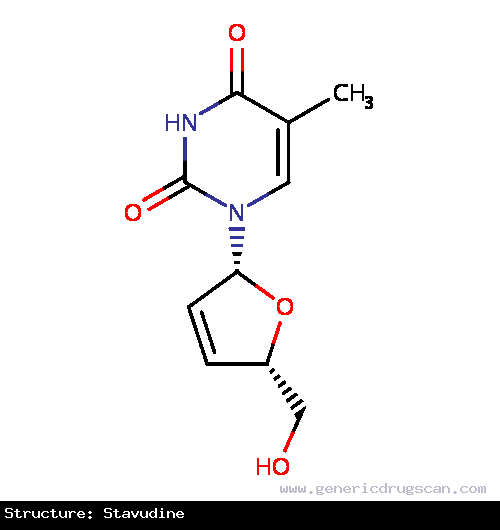Stavudine Drug: Indication, Dosage, Precaution, Side Effect , Storage, Category Type and corresponding Brands - www.genericdrugscan.com
Stavudine
Drug Status in USA : ApprovedDrug Status in Canada : Approved
pronunciation
pronounced as (stav' yoo deen)
Why is this medication prescribed?
Stavudine is used along with other medications to treat human immunodeficiency virus (HIV) infection. Stavudine is in a class of medications called nucleoside reverse transcriptase inhibitors (NRTIs). It works by decreasing the amount of HIV in the blood. Although stavudine does not cure HIV, it may decrease your chance of developing acquired immunodeficiency syndrome (AIDS) and HIV-related illnesses such as serious infections or cancer. Taking these medications along with practicing safer sex and making other life-style changes may decrease the risk of transmitting (spreading) the HIV virus to other people.
How should this medicine be used?
Stavudine comes as a capsule and a solution (liquid) to take by mouth. It is usually taken twice a day (every 12 hours), with or without food and with plenty of water. To help you remember to take stavudine, take it at around the same time each day. Follow the directions on your prescription label carefully, and ask your doctor or pharmacist to explain any part you do not understand. Take stavudine exactly as directed. Do not take more or less of it or take it more often than prescribed by your doctor.
If you are giving the oral solution to a child, shake the bottle well before each use to mix the medication evenly. Use the measuring cup provided to measure the child's dose.
Stavudine controls HIV infection but does not cure it. Continue to take stavudine even if you feel well. Do not stop taking stavudine without talking to your doctor. If you miss doses or suddenly stop taking stavudine, your condition may become more difficult to treat.
What are the precautions to be followed?
Before taking stavudine,- tell your doctor and pharmacist if you are allergic to stavudine or any other medications.
- tell your doctor and pharmacist what prescription and nonprescription medications, vitamins, nutritional supplements and herbal products you are taking. Be sure to mention those listed in the IMPORTANT WARNING section and zidovudine (Retrovir, also an ingredient in the combination products Combivir and Trizivir). Your doctor may need to change the doses of your medications or monitor you more carefully for side effects.
- tell your doctor if you have or have ever had kidney disease, diabetes (if you are taking stavudine solution), or peripheral neuropathy (a type of nerve damage that causes tingling, numbness, and pain in the hands and feet).
- tell your doctor if you are breast-feeding. You should not breastfeed if you are infected with HIV or if you are taking stavudine.
- you should know that stavudine may cause side effects that must be treated right away before they become serious. Children who are taking stavudine may not be able to tell you about the side effects they are feeling. If you are giving stavudine to a child, ask the child's doctor how you can tell if the child is having these serious side effects.
- you should know that your body fat may increase or move to different areas of your body such as your breasts and your upper back.
What are possible side effects of this medication ?
Stavudine may cause side effects. Tell your doctor if either of these symptoms is severe or does not go away:- headache
- diarrhea
- numbness, tingling, burning or pain in the hands or feet
- difficulty moving your hands and feet
- rash
How to store the medication and dispose it of after its use later?
Keep this medication in the container it came in, tightly closed, and out of reach of children. Store the capsules at room temperature and away from excess heat and moisture (not in the bathroom). Store the solution in the refrigerator and throw away the unused portion after 30 days. Throw away any medication that is outdated or no longer needed. Talk to your pharmacist about the proper disposal of your medication.
Drug Category/Class
- Anti-HIV Agents
- Antimetabolites
- Reverse Transcriptase Inhibitors
- Antiinfectives for Systemic Use
- Direct Acting Antivirals
- Antivirals for Systemic Use
- Nucleoside and Nucleotide Reverse Transcriptase Inhibitors
- Nucleoside and nucleotide reverse transcriptase inhibitors
- Antivirals for treatment of HIV infections, combinations
| Prescribed | For the treatment of human immunovirus (HIV) infections. |
| Weight : | 224.2133 |
| Structure | Stavudine |
 | |
| Formula | C10H12N2O4 |
Stavudine has 12 Brands listed
| Stadin (30 mg) | Stadin (40 mg) |
| Stadine (30 mg) | Stadine (40 mg) |
| Stag (30 mg) | Stag (40 mg) |
| Stavex (30 mg) | Stavex (40 mg) |
| Stavir (30 mg) | Stavir (40 mg) |
| Virostav (30 mg) | Virostav (40 mg) |
Search Generic Drugs alphabetically
